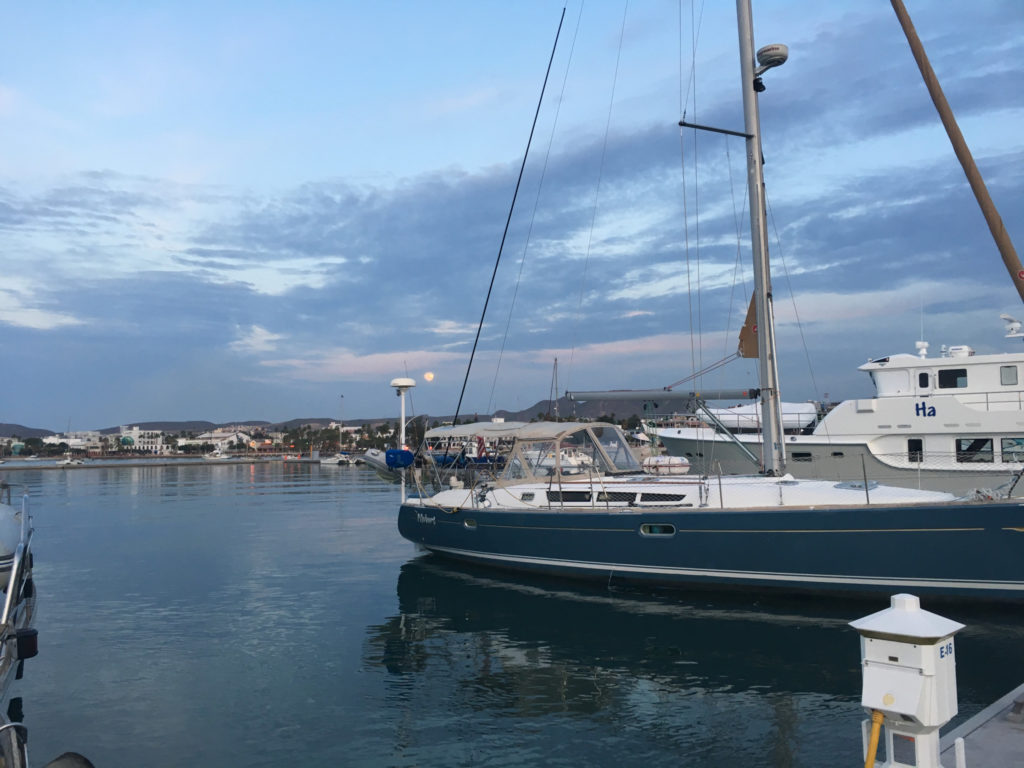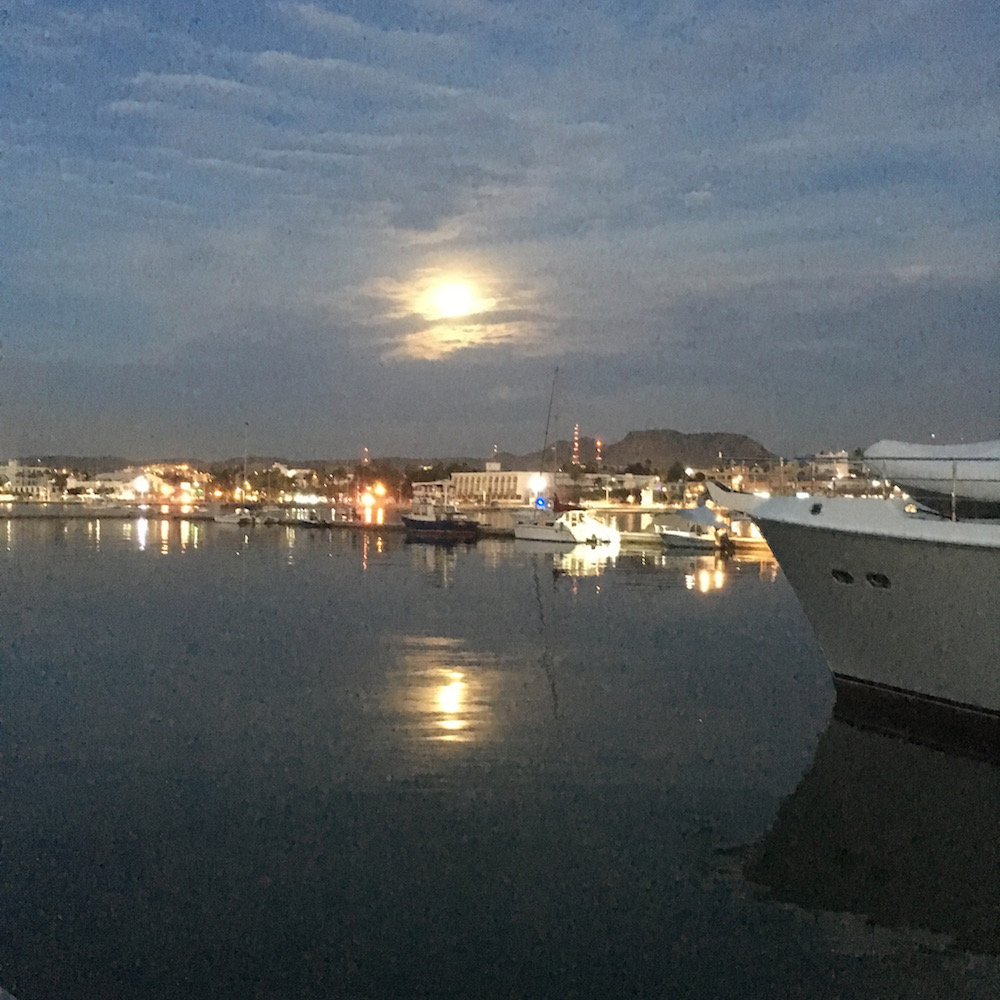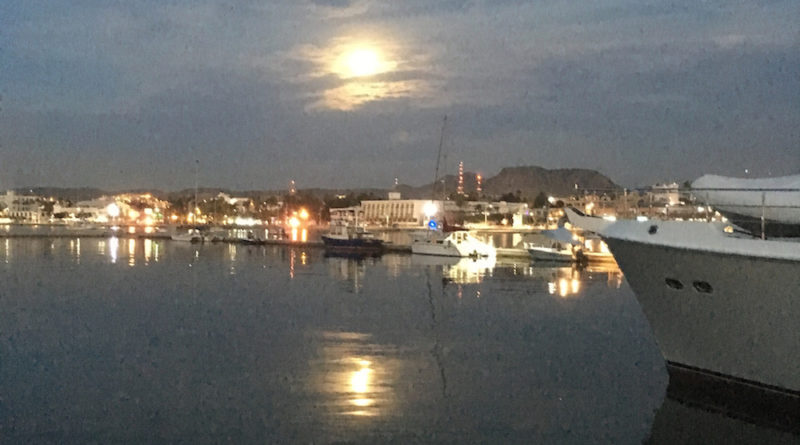Caught In The Middle Of Drug Wars In La Paz
It had been a long week of merrymaking as we prepared the boat, and ourselves, for Christmas. Christmas decorations, Christmas cookies, Christmas gingerbread houses – if we weren’t in the holiday spirit by now, we’d never be!
It was Saturday, and we were preparing to leave La Paz the following morning, and head north to Balandra and the Espiritu Santo islands. The islands required a permit, and of course we’d been so busy spreading Christmas cheer all week that we’d forgotten to get the permits while the government offices were open during business hours. So, we had to find a way to get the passes on a weekend. The only option was the Whale Museum on the malecón, and they were closing in 30 minutes.
In a panic, a grabbed my pack and ran along the malecón, rushing to make it to the museum before they closed at 5PM. Realizing I couldn’t get there in time, I flagged down a cab, and hopped in. With 20 minutes to spare, I made it to the museum, and ran inside. Thank goodness!
“Hi, I need to buy five passes for Espiritu Santo,” I told the woman at the counter. I would have loved to have tried purchasing the passes in Spanish, but in my frazzled state, I didn’t have the brain capacity to process a foreign language.
“No problem,” the woman replied, and reached behind her to get the passes. She pulled several wristbands out of an envelope, and asked, “How many days do you need?”
“Actually, I need the books. Like the passports? For the whole year?”
“Oh,” she said with some concern, and my heart fell. “We ran out of those. We will receive more on Tuesday.”
NO! We were leaving tomorrow, Sunday, and we couldn’t wait until Tuesday. I can’t survive in La Paz until Tuesday, I thought. We had to make our way north to pick up a guest in Loreto. If we didn’t leave tomorrow, we’d never make it in time.
I pleaded, and asked every which way I could, in every language I could, if there was anywhere else to get the passes on a Saturday evening or a Sunday, anytime. The woman repeatedly told me that, no, the passes wouldn’t be available anywhere near town until Tuesday. She even crushed my hopes of going to a government office on Monday morning, since it was apparently a government holiday.
Defeated, I sat down on the sidewalk outside and tried to figure out what to do. We could just go to the islands anyway, and chances are no one would check for our passes, but if they did we could be in big trouble. What’s more, it was important that everyone does their part to protect the islands, and that includes purchasing the proper credentials. We were doomed. I stared bleakly as the Applebee’s two blocks down, and figured the only thing to do was go back to the boat and talk to Rich.
Back at the boat, the girls from Taliesin Rose were on Mobert playing, and their dad, Rowan, came over to check on them. Rich quickly became absorbed in his second favorite pastime – dock chat. The only thing he enjoys more than normal dock chat, is dock chat at happy hour. Of course, since it’s always happy hour for cruisers, and he didn’t have a drink, he was simply doing it wrong.
Nonetheless, he quickly became absorbed in seafaring conversation with Rowan. The afternoon was warm, but not too hot to stand outside. As the men chatted, passers-by joined the conversation and drifted off at intermittent intervals, like particles of loosely bonded atoms. Birds flew lazily by overhead, and the sea water rippled in the breeze. It was a perfectly calm and lazy late afternoon along the La Paz waterfront.
Rich was remarking on his latest repair projects when the silken smooth fabric of the afternoon was suddenly ripped straight through. A few hundred yards away, on the malecón, several dozen BANGS! brutally punctured the afternoon calm, in short-burst, rapid succession. Rich stopped mid-sentence, and turned to the malecón, along with the others he was chatting with. There was construction all along the malecón, and some of the heavy equipment must have malfunctioned. Maybe even backfired. Although that didn’t quite fit. Their brains sifted aimlessly, processing the sound furiously. Before they had finished and begun exchanging theories, the scene changed to provide more clues. From both the north and the south, and from over the hill to the west, police cars flooded the malecón. Rich, Rowan, and the others watched as the flashing lights convened at the Applebee’s, where several dozen officers jumped out of the car, and began managing traffic for several aid cars to arrive. It wasn’t a backfire, or machinery, that slashed through the afternoon. It was automatic weapons fire. At the Applebee’s. The Applebee’s less than two blocks from my destination.
Only a few phrases were exchanged before Rowan said what Rich was thinking: “You should call Devon.” Channeling his energy to maintain calm around him and within, as he always did instinctively in a crisis, he agreed, and pulled his phone out of his pocket. He dialed, and waited patiently for his wife to pick up. Although he fully expected her to answer, a shadow of doubt remained. With each ring, doubt grew, like a B-movie blob feeding on the fear of substandard actors. An eternity passed.
I almost didn’t answer.
I’d failed in my mission. The walk home along the malecón was too short for proper wallowing in self-pity, so I’d decided to take a more circuitous route and explore town. I was several blocks up the hill when my phone rang. I hesitated, but realizing I had to tell him sooner or later, I picked up just before it went to voicemail.
“Hello?” I pouted.
“Dev?” said a tense monotone.
“Yeah,” I complained further.
“Hey, where are you?” After nearly nine years of marriage, I knew when he was trying to sound casual, but underneath was quite tense.
“In town, why?” I asked, becoming concerned.
“So you’re not near the Applebee’s?” he asked.
“No, I couldn’t get the passes, so I decided to take the long way home,” I confessed. “Why, what’s at the Applebee’s?” Obliviously curious, I changed course back toward the malecón, making a direct shot down to the Applebee’s.
“Oh, nothing,” he lied. “Just wasn’t sure where you were.”
“Why?” I asked again, knowing there was far more to his call than that.
“Well, we heard a noise on the malecón. And some police. And we weren’t sure what it was. You should just come back, and we’ll see you soon.”
I was just a block from the Applebee’s now, and I could see the entire intersection was cordoned off. “Okay, I will,” I said absentmindedly, now fixated on the scene in front of me. “See you soon,” I said, and hung up.
The flashing lights were so ubiquitous they were disorienting in the early evening light. Several people stood around, watching, as police ran to and fro, stopping passers-by, measuring, inspecting, all with a shared sense of urgency.
I turned to a man standing nearby. “¿Que pasó?”
He said something in Spanish I didn’t understand. Seeing my confusion, he said it again and then, whistling, made a violent motion with his finger, jabbing it into his gut. I still didn’t understand the Spanish, but the gesture was clear: A shooting.
I stood there for a minute, wondering what had happened, searching for answers. But, the scene revealed none, and not wanting to be a gawker, I moved on. I walked back up the hill, away from the malecón, which was completely blocked by police tape and flashing lights. As I passed around behind the scene of the crime, police swarmed. Several people were walking by, and one of them caught an officer’s eye. The officer grabbed his partner, and they raced up the street. The man smiled defensively at them, and apparently didn’t answer questions to their satisfaction, because they put him in handcuffs and walked him over to their car. The man’s friend who he’d been walking with, who’d been completely ignored by the police, just hung back and watched. After a minute, the police had satisfied whatever suspicion they had, and let the man go. The man trotted back up the hill and cheerfully caught up with his friend, as though police detention outside shooting scenes was a typical part of his evenings.
I continued along also, and was back at the boat fifteen minutes later. No one seemed particularly happy to see me. Oh well.
We enjoyed a beautiful sunset and moonrise over the bay. Its beauty was dampened by the knowledge that there was at least one fewer soul in the world to enjoy it.


We learned what happened the next day. It wasn’t anywhere in American or English-speaking media, and Rich had to search the web in Spanish, and use bots to translate. After much work, he finally figured out that several members of a drug cartel ambushed a tourist police vehicle as it drove along the malecón. The narcos were waiting in their car, at the corner. They opened fire on three police officers as they drove by. All three officers were killed. We never heard if they caught the shooters, or if they got away.
The shootings were very targeted, and although there’s always a danger of being caught in the crossfire, we never feared for our own safety. The drug wars in La Paz are between the police and the narcos; even the locals agree that anyone not involved in the drug trade, or trying to stop it, is safe. And tourists, with their foreign money, are even safer. But, it certainly didn’t make our departure from La Paz the next morning any more difficult. It was a dry, brown city. The waterfront was crawling with judgy, holier-than-thou cruisers. It had supplies, but we were stocked and ready to continue on our adventure.

